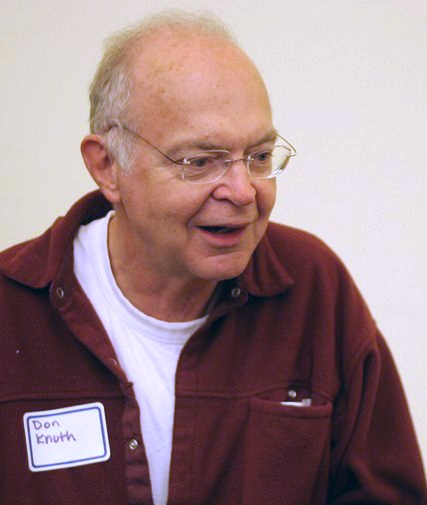<Back to Index>
- Computer Scientist Donald Ervin Knuth, 1938
- Architect John Wellborn Root, 1850
- President of the Republic of Spain Manuel Azaña Diaz, 1880
PAGE SPONSOR


Donald Ervin Knuth (born January 10, 1938) is a renowned computer scientist and Professor Emeritus of the Art of Computer Programming at Stanford University.
Author of the seminal multi-volume work The Art of Computer Programming ("TAOCP"), Knuth has been called the "father" of the analysis of algorithms,
contributing to the development of, and systematizing formal
mathematical techniques for, the rigorous analysis of the computational
complexity of algorithms, and in the process popularizing asymptotic notation. In addition to fundamental contributions in several branches of theoretical computer science, Knuth is the creator of the TeX computer typesetting system, the related METAFONT font definition language and rendering system, and the Computer Modern family of typefaces. A writer and scholar, Knuth created the WEB/CWEB computer programming systems designed to encourage and facilitate literate programming, and designed the MMIX instruction set architecture. Knuth was born in Milwaukee, Wisconsin, where his father owned a small printing business and taught bookkeeping at Milwaukee Lutheran High School,
which he attended. He was an excellent student, earning achievement
awards. He applied his intelligence in unconventional ways, winning a
contest when he was in eighth grade by finding over 4,500 words that
could be formed from the letters in "Ziegler's Giant Bar." The judges
had only about 2,500 words on their master list. This won him a
television set for his school and a candy bar for everyone in his class. Knuth had a difficult time choosing physics over music as his major at Case Institute of Technology (now part of Case Western Reserve University). He also joined Theta Chi Fraternity.
He then switched from physics to mathematics, and in 1960 he received
his bachelor of science degree, simultaneously receiving his master of
science degree by a special award of the faculty who considered his
work outstanding. At Case, he managed the basketball team and applied
his talents by constructing a formula for the value of each player.
This novel approach was covered by Newsweek and by Walter Cronkite on the CBS television network. As an undergraduate at Case, Knuth was hired to write compilers for different computers. In 1963, he earned a Ph.D. in mathematics (advisor: Marshall Hall) from the California Institute of Technology, where he became a professor and began work on The Art of Computer Programming,
originally planned to be a single book, and then planned as a six, and
then seven-volume series. In 1968, he published the first volume. That
same year, he joined the faculty of Stanford University, having turned down a job offer from the National Security Agency (NSA). In 1971, Knuth was the recipient of the first ACM Grace Murray Hopper Award. He has received various other awards including the Turing Award, the National Medal of Science, the John von Neumann Medal, and the Kyoto Prize.
After producing the third volume of his series in 1976, he expressed
such frustration with the nascent state of the then newly developed
electronic publishing tools (especially those that provided input to
phototypesetters) that he took time out to work on typesetting and
created the TeX and METAFONT tools. In recognition of Knuth's contributions to the field of computer science, in 1990 he was awarded the one-of-a-kind academic title of Professor of The Art of Computer Programming, which has since been revised to Professor Emeritus of The Art of Computer Programming. In 1992 he became an associate of the French Academy of Sciences. Also that year, he retired from regular research and teaching at Stanford University in order to finish The Art of Computer Programming. In 2003 he was elected as a foreign member of the Royal Society.
As of 2004, the first three volumes of his series have been re-issued,
and Knuth is currently working on volume four, excerpts of which are
released periodically on his website. Meanwhile, Knuth gives informal lectures a few times a year at Stanford University, which he calls Computer Musings. He is also a visiting professor at the Oxford University Computing Laboratory in the United Kingdom. In addition to his writings on computer science, Knuth, a devout Lutheran, is also the author of 3:16 Bible Texts Illuminated (1991), in which he attempts to examine the Bible by a process of systematic sampling,
namely an analysis of chapter 3, verse 16 of each book. Each verse is
accompanied by a rendering in calligraphic art, contributed by a group
of calligraphers under the leadership of Hermann Zapf. He is also the author of Surreal Numbers (1974), a mathematical novelette on John Conway's set theory construction of an alternate system of numbers. Instead of simply explaining the
subject, the book seeks to show the development of the mathematics.
Knuth wanted the book to prepare students for doing original, creative
research. On
January 1, 1990, Knuth announced to his colleagues that he would no
longer have an e-mail address, so that he might concentrate on his work. In 2006, Knuth was diagnosed with prostate cancer.
He underwent surgery in December that year and started "a little bit of
radiation therapy [...] as a precaution but the prognosis looks pretty
good," as he reported in his video autobiography. Knuth was elected as a Fellow (first class of Fellows) of the Society for Industrial and Applied Mathematics in 2009 for his outstanding contributions to mathematics.